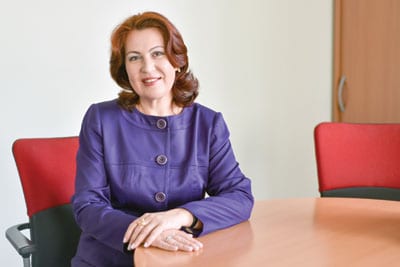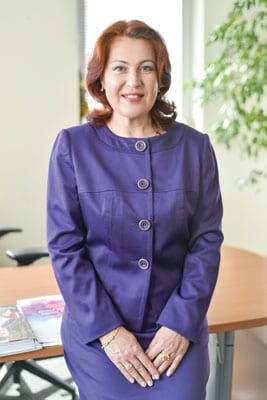The Foreign Investors Council expects the government to speed up important structural reforms, especially privatisation and the corporatisation of state-owned enterprises, to press for better implementation of the laws, with special focus on the Tax Administration and inspections, and to continue with the good work on harmonisation of the Serbian laws with EU Acquis
The only way to ensure that new and current laws are implementable and conducive to growth is to maintain active dialogue between the Government and the private sector,” says Yana Mikhailova, new President of the Foreign Investors Council (FIC) and Nestlé Adriatic Regional Director.
Sudden changes in tax regulations and the introduction of new para-fiscal charges with the mandatory membership in Serbian Chamber of Commerce, undermined previously carefully nurtured teamwork, and FIC is working hard to re-establish communication with the tax authorities and openly discuss such issues Ms Mikhailova says.
As the newly appointed President of Foreign Investors Council, Serbia, how do you estimate the overall business climate in Serbia today?
Let me start by saying that I am honoured to have the opportunity to lead such strong association together with my colleagues from the FIC Board towards better and simpler business conditions in Serbia. If I would have to summarise in one sentence the status of the business climate in Serbia, I would say that a lot has been done in terms of harmonisation of laws with EU regulations, but the implementation of laws is still lagging behind.
Judging from your experience as Nestlé CEO for the region, do you think that investors see the Western Balkan as a more or less homogeneous business area, or are there still a lot of hurdles?
My personal opinion is that Western Balkans will never be homogeneous business area since its countries have diverse regulations and different level of economic development. However, various reports (i.e., World Bank Doing Business) show that there is an improvement in the macro-economic situation in this area, which is very positive.
In order to increase the number of new investors, Serbia needs to improve its investment climate and reduce unnecessary bureaucracy, becoming more attractive for small and medium-sized businesses
How much does the investment climate in Serbia stand out in comparison with the progress made in other countries in the region?
Serbia compares relatively well with its neighbours, but it is not only with neighbours that Serbia competes. Serbia gains advantages from its excellent geostrategic positioning and well-developed framework of free-trade agreements, not only with CEFTA within the region and the EU but also with Russia, Ukraine, Belarus, Turkey and EFTA countries. Also, we see that Serbia has expanded its economic relations with Middle Eastern countries. All things considered, it is a good place to invest if you’re a big company, and you’re coming with a large investment (less vulnerable, and your voice is better heard). But if you are a small investor, there are too many obstacles, bureaucracy and stiff competition.
In order to increase the number of new investors, Serbia needs to improve its investment climate and reduce unnecessary bureaucracy, becoming more attractive for small and medium-sized businesses.
In which areas has the Serbian government made the biggest progress in reforms in the last 12 months?
The Foreign Investors Council tracks the period of the past two years in which we focused our attention on five areas which our members identified as priorities through their committees. These are 1. Streamlined bankruptcy procedure, 2. More flexible labour regulations, 3. Simplified construction permitting and land conversion, 4. Better inspection systems to fight illicit trade, and 5. A more consistent and predictable tax system. The concrete answer to your question is that we achieved significant progress in four out of five of these topics. Around 60% of FIC recommendations have been adopted and implemented in the last year and a half.
Where is progress less visible or non-existent?
The only topic that lags behind taxes, and for that reason this is a subject of the utmost importance for our members currently. The end of last year brought a lot of difficulties in this area, with sudden changes in most of the tax laws and the introduction of new para-fiscal charges with the mandatory membership in Serbian Chamber of Commerce.
How has the government’s record on this affected the overall investment climate?
The Foreign Investors Council objected to this situation since it brought changes in the previously established good practice of consultations with the private sector regarding new laws.

Moreover, these laws significantly contributed to the changes of the regulatory framework, since the sudden amendments of those laws brought negative consequences to the predictability of doing business. Last, but not least, some new laws also brought new obstacles to businesses, such as the introduction of a new para-fiscal charge through mandatory membership in the Serbian Chamber of Commerce. In a certain way, it impacted investors’ level of confidence, and we are working closely with the authorities to bring back the mutual trust and to try to solve the mentioned issues.
In light of this, what do you see as the top priorities of the new government in general?
In terms of priorities, the Foreign Investors Council has three main expectations: 1. Accelerating important structural reforms, especially in the privatisation and corporatisation of state-owned enterprises, 2. Better law implementation by increasing administrative capacities in the ministries and other state institutions, with the special focus on the Tax Administration and inspections, and 3. Continuing efficient harmonisation of Serbian laws with EU Acquis.
The FIC believes that better law implementation can be achieved through public administration reform and increasing the administrative capacity in the ministries and other state institutions with a special focus on the Tax Administration and inspections
The only way to ensure that new and current laws are implementable and conducive to growth is to maintain active dialogue between the Government and the private sector. We believe that EU accession negotiations are the perfect mechanism for improving Serbia’s competitiveness and the FIC can help in this process as 70 per cent of its members come from the EU.
What would you point out specifically in terms of business climate improvement for investors who are already operating in Serbia?
In particular reference to business climate improvement, harmonisation with the EU Acquis is needed in: the Law on Foreign Exchange Operations to enable cash-pooling and expand the possibilities for issuing guarantees by non-residents; the Law on Charges to safeguard against new para-fiscal charges; the Law on Personal Data Protection to be harmonised with EU Directive 95/96/46/EC, and the regulation of Staff Leasing is needed since it is not currently regulated.
 The key challenge still is the enforcement of laws, and focus should be put on the privatisation process, which needs to be significantly accelerated and organised in a transparent manner, the Law on Inspections where we expect the full functioning of the Coordination Body and the creation of a Council for Risk Analysis, in order to strengthen cooperation between the various ministries and inspections to ensure efficient and consistent implementation of the new Law.
The key challenge still is the enforcement of laws, and focus should be put on the privatisation process, which needs to be significantly accelerated and organised in a transparent manner, the Law on Inspections where we expect the full functioning of the Coordination Body and the creation of a Council for Risk Analysis, in order to strengthen cooperation between the various ministries and inspections to ensure efficient and consistent implementation of the new Law.
We also expect better coordination in taxation between the Ministry of Finance and the Tax Administration, and also Tax Administration reform to introduce a more consistent and efficient implementation of tax regulations. Finally, regarding the Law on Land Conversion, we expect to see the quick implementation of the new Law on Land Conversion, which enables the introduction of private ownership over the land.
The FIC believes that better law implementation can be achieved through public administration reform and increasing the administrative capacity in the ministries and other state institutions with a special focus on the Tax Administration and inspections.
Which additional issues are at the moment in the FIC focus?
On a daily basis, our eight committees closely monitor all relevant regulatory changes and try to react proactively to provide concrete recommendations for improvement of draft regulations. We also pay attention to the implementation process with the same energy and efforts, and the topics we deal with are various – such as the Rulebook on Labelling, that is important for the food and agriculture sectors, the conversion process that is the focus of the FIC Real-Estate Committee, the latest changes in the CIT law, in particular, related to rules on withholding tax on services prescribed by those changes that are of interest of FIC Taxation Committee.
Sudden changes in the tax regulations and introduction of new para-fiscal charges undermined trust between authorities and foreign investors, and we are working hard to restore it
In which areas has the dialogue between FIC and the government been the most intense?
The intensity of our dialogue with the Government and other stakeholders actually depends on the topics that are in our focus at present. As I already stated, taxes are the FIC’s number one priority for the time being. We have not stood still, but rather we have engaged all our efforts to re-establish communication with the tax authorities and openly discuss all issues bothering investors and the different ways to overcome them. The many problems in the tax area are not new, and I would say that in direct communication with the Tax Administration Director, we have analysed the situation deeply, and FIC will put more resources in trying to resolve some issues that could be achieved in a shorter time period.
How do you see the further improvement of the activities of the Foreign Investors Council, Serbia?
I am happy to share that we at FIC engage efforts to reconsider our strategy and activities from time to time and are always eager to listen carefully to our members and implement those ideas that correspond to the majority of their opinions. Over the years, we have adjusted our internal communications to their needs as well as established several new events and activities that are of their interest. This means that we are flexible and as long as the members have an interest in certain topics or activities, we continue with them.
On the other hand, if there is no further interest, we stop with those activities. At the end of last year, and for the first time, the FIC conducted internal research on membership satisfaction with the services that we provide, and members rated FIC as ‘’very good’’. We are satisfied with this result but will work further to improve overall FIC performance and efficiency.
Do you think that the fact that a woman is again presiding the largest association of investors may send a signal to the Serbian business community to have more women in the leading roles?
I hope that it would in the near future. We still live in a society that is not equal in the terms and opportunities it provides to men and women. I would be very delighted to see more successful women leading the businesses and contributing to the better society in whatever possible form.